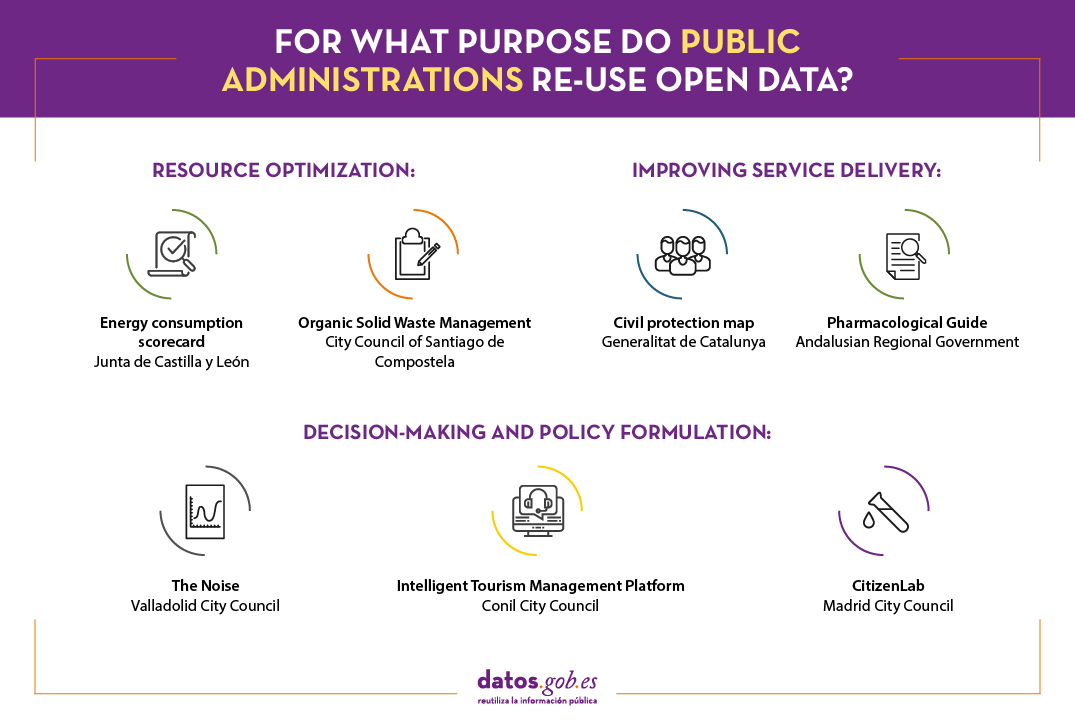
Open data is a source of information for the development of smart services, as well as for decision-making and policy-making. It is therefore not surprising that an increasing number of public bodies, in addition to opening data - for reuse by others and for reasons of accountability and transparency - are also reusing their own data for different purposes.
In this sense, the rise of smart city management platforms is encouraging many city councils and autonomous communities to develop smart applications and tools that take advantage of the use of data and analytical techniques to innovate and improve the public services they offer to citizens. Below, we show you several examples.
Resource optimisation
Open data can be used by public bodies to understand how public resources are being managed, as well as to promote actions that enable more efficient management and economic savings, e.g. in terms of energy consumption or by promoting more efficient resource management.
Energy consumption scorecard. Junta de Castilla y León.
This energy datahub, developed by the open data initiative of the Junta de Castilla y León, offers detailed and visual information on energy consumption in the centres managed by the Junta, such as educational centres, health centres, administrative offices or hospitals, among others.
It is a scorecard that gathers information from more than 1,500 consumption centres, offering different types of graphical representations that make it easier for the reader to understand the data. The data source used for the development of this platform can be consulted via this link.
The tool facilitates disaggregated analysis by type of energy and geographical location. This information may be of interest to citizens, but also to the Board's own managers. Thanks to this platform, between 2015 and the beginning of 2020, the Board saved more than 12 million euros in electricity.
In addition, the regional government has an electricity table that focuses exclusively on the electricity consumption of hospitals in Castilla y León on an hourly basis. The data is linked to meteorological information, so that future costs can be estimated and the use of heating can be optimised. The data used to develop this table can be consulted here.
Organic solid waste management. City Council of Santiago de Compostela.
The City Council of Santiago de Compostela has launched, within the Smartiago initiative, a project that aims to achieve a sustainable and intelligent management of municipal solid waste (MSW). The main objective of this tool is to design, develop and build smart surface containers for the characterisation of organic solid waste, based on the use of open IoT technologies, the application of machine learning algorithms and the use of open data as sources for the enrichment of community composting prediction models. This aims to achieve the 50% readiness for reuse and recycling target, up from the current 13%. The project, currently under development, will also include a gamification app to encourage good practices in sustainability.
Improving service delivery
Thanks to open data it is also possible to create tools for social service professionals to provide a better response and attention to the needs of citizens. Let's look at a couple of examples:
Civil protection map. Generalitat de Catalunya.
This interactive map shows the main resources of the civil protection system in Catalonia. The civil protection map allows you to see where the different risks are located (technological, environmental...) and the situation of the teams in order to better plan responses. Here you can consult the main source of data used by this tool.
Pharmacological Guide. Andalusian Regional Government.
This application has been designed by the Andalusian Regional Government to offer healthcare professionals a faster and more efficient consultation of the main drugs used in emergency care in Andalusia. It is a useful working tool for those healthcare professionals who aid in critical situations as it includes constantly updated and contrasted information on the main indications, doses, contraindications and interactions of the most commonly used drugs.
Decision-making and policy formulation
Open data provides greater knowledge about what is happening around us, enabling us to make better decisions. It is a very useful tool for public bodies to develop policies that respond to the real needs of citizens. Over the last year, we have seen how measures to prevent the spread of COVID-19 have been taken on the basis of data on the evolution of the disease. Other examples are:
The Noise Map. Valladolid City Council.
Valladolid City Council has a Noise Map that organises information on noise pollution. This map has been developed to be used in a compulsory way in the execution of the calculations foreseen in the different regulatory standards, as well as in the technical building code and which will apply to residential, institutional and industrial buildings, as well as in the technical building code and which will apply to residential, institutional and industrial buildings.
Intelligent tourism management platform. Conil Town Council.
Within the framework of Red.es' Smart Cities, Territories and Islands calls for proposals, we are finding more and more proposals that include the development of data management platforms that promote efficient decision-making. One example is the City Council of Conil de la Frontera, which is working with a smart tourism management platform to increase the knowledge of tourists, through the aggregation and centralisation of data related to the origin of the tourist, mobility and most visited areas, preferred places to visit and stay overnight or satisfaction surveys, among other parameters. In this way, the local administration can identify patterns and carry out actions to adapt and improve management, detect irregularities, promote economic and business development or favour the generation of employment in the priority areas identified. These data have also been used to estimate the real population during the pandemic and to make a better estimate of incidence rates. Although these data do not appear to be public for the moment, the aim is to open them to companies through an open data platform.
CitizenLab. Madrid City Council.
The regional government of Madrid, together with Grant Thornton, has launched a datalab to better understand citizen behaviour. The project seeks to analyse predictive models of citizen behaviour using Big Data and Artificial Intelligence (AI), with the aim of improving public services in the Madrid region in areas such as mobility, healthcare, tourism and infrastructure. In the last year, for example, it has been used to predict the demand for vaccines.

Undoubtedly, there are numerous applications and digital tools used by public administrations - and it seems that there will be more - that base their operation on open data to offer more and better services to citizens. In this article we have compiled some examples, but if you know of any related ones that may be of interest, do not hesitate to leave a comment or write to us at our email address dinamizacion@datos.gob.es.
Content prepared by the datos.gob.es team.
Muy interesante el concepto de los datos para la digitalizacion. Sin duda, hay que poner mas empeño...
Gracias.
https://www.example.com